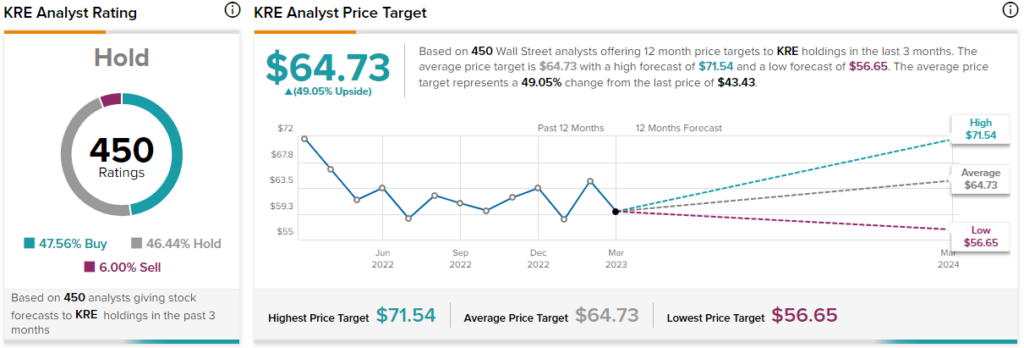Many investors know that Warren Buffett says to be greedy when others are fearful. Well, right now, there’s plenty of fear in the banking sector, especially when it comes to regional banks. However, it can be hard to heed that advice in real time when you’re worried about a stock going to zero like Silicon Valley Bank or Signature Bank. Here’s where ETFs like the SPDR S&P Regional Banking ETF (NYSEARCA:KRE) come in handy.
Meet Your ETF AI Analyst
- Discover how TipRanks' ETF AI Analyst can help you make smarter investment decisions
- Explore ETFs TipRanks' users love and see what insights the ETF AI Analyst reveals about the ones you follow.
The Appeal of Using an ETF in a Storm
Investors can use ETFs like the SPDR Regional Bank ETF to gain exposure to a potential rebound in the regional banking sector. The benefit is that investors won’t be exposing themselves to the single-stock risk of a stock like Silicon Valley Bank because ETFs are diversified.
KRE is incredibly diversified, with 143 holdings. Furthermore, its top 10 holdings make up just 20.3% of assets, giving investors plenty of protection against the risk of a single bank going under. KRE’s top holding, East West Bancorp, makes up just a paltry 2.14% of assets. Below is a look at KRE’s top 10 holdings using TipRanks’ holdings tool.

Many of these top holdings also look attractive using TipRanks’ proprietary Smart Score system. Top holding East West Bancorp, as well as fellow top-holdings PNC Financial and WinTrust Financial, all have Smart Scores that clock in at a ‘Perfect 10’. The Smart Score is TipRank’s proprietary quantitative stock scoring system that evaluates stocks on eight different market factors. The score is data-driven and does not involve any human intervention.
Additionally, it’s worth noting that at the end of last quarter, Silicon Valley Bank was KRE’s top holding, and some of the other banks most caught up in the recent drawdown were also top 10 holdings, such as First Republic Bank and Zions Bancorporation. While SVB becoming a zero certainly hurt KRE, the fact that it was only 1.9% of the fund shows the strength of diversification, as this was a hit that KRE can still bounce back from rather than a fatal one.
The likelihood of more regional bank failures seems more remote than it did a week ago. For one thing, the new Bank Term Funding Program from the Federal Reserve should help these banks weather the storm. Secondly, Silicon Valley Bank was hardly your typical regional bank. It catered heavily towards tech and biotech startups, so it’s a fairly unique situation.
Long-duration, “risk-on” assets like tech startups are hurt by rising interest rates. The other two banks that recently went under, Silvergate Capital and Signature Bank, were also outliers due to their involvement in the cryptocurrency industry.
The Risk/Reward Ratio Is Starting to Look Attractive
While there is indeed risk in regional banks and challenges that the industry needs to sort through, valuations are starting to look attractive after the recent sector-wide sell-off based on a number of metrics.
For example, holdings like Zions Bancorporation, Key Corp, and EastWest Bancorp now trade at 5.5, 6.4, and 6.3 times earnings, respectively, well below the average price-to-earnings multiple for the S&P 500, which is currently over 20. Even the third-biggest holding, PNC Financial, which is a regional banking company with a market cap of $50 billion, trades at just 9.3 times earnings. KRE itself has an attractive average price-to-earnings multiple of just 7.7 as of March 16th.
Furthermore, many of these holdings are trading at book value or even slightly below it, meaning that the stock is trading for less than the company would be worth if its assets were liquidated today, giving investors a considerable margin of safety. Similarly, KRE trades at a slight discount to book value, with a price-to-book ratio of just under 1.0x.
Looking at some of the dividend yields amongst KRE’s holdings also shows that there is some serious value in this sector — Key Corp currently yields 6.9%, while Zions yields 5.4%, and PNC yields 4.9%. Thanks to these high-yielding stocks, the KRE ETF offers a solid dividend yield of 3.4%. In addition to this solid dividend yield, KRE also features a reasonable expense ratio of 0.35%.
Analysts Expect Considerable Upside Potential Ahead
Wall Street analysts also see considerable upside ahead for KRE. While the consensus rating on the ETF is a Hold (i.e. neutral), the average KRE stock price target of $64.73 implies significant upside potential of 49% versus today’s prices, which would be an attractive return for investors.

TipRanks uses proprietary technology to compile analyst forecasts and price targets for ETFs based on a combination of the individual performances of the underlying assets. By using the Analyst Forecast tool, investors can see the consensus price target and rating for an ETF, as well as the highest and lowest price targets.
TipRanks calculates a weighted average based on the combination of all the ETFs’ holdings. The average price forecast for an ETF is calculated by multiplying each individual holding’s price target by its weighting within the ETF and adding them all up.
Be Greedy and Smart When Others are Fearful
KRE is down an ugly 21% year-to-date, and while that paints a bit of a bleak picture, the ETF has been a winner over periods of time. For example, KRE was a big winner in 2021, returning 39.3% for the year, indicating that investors can make lucrative returns with this ETF but that it’s probably one to trade as opposed to buy and hold forever.
Bottom line
In conclusion, the banking sector has rattled investors, but it can pay to be greedy when others are fearful. But just being greedy can often lead to costly mistakes — that’s why investors need to be both smart and greedy in a fearful environment. Investing in beaten-down regional bank stocks looks like an interesting, high-risk, high-reward opportunity right now, and investing in a highly diversified ETF like KRE, rather than taking on single stock risk in this volatile sector, looks like a smart way to do it.
Caution is still warranted, of course, and investors would be best-served by making KRE one part of a well-balanced portfolio strategy, but this looks like a favorable risk/reward setup, in my view.

















